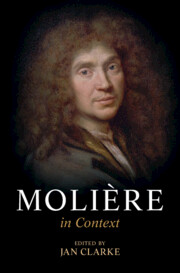Book contents
- Molière in Context
- Molière in Context
- Copyright page
- Dedication
- Contents
- Figures
- Charts and Tables
- Contributors
- Acknowledgements
- Translations
- Abbreviations
- Biographical Preface
- Part I Socio-Political Context
- Part II Intellectual and Artistic Context
- Part III Theatrical Context (Paris)
- Part IV Theatrical Context (Court)
- Part V Reception and Dissemination
- Chapter 23 Audience Laughter
- Chapter 24 The Triumph of Publicity
- Chapter 25 Molière and His Critics: The ‘Querelles’
- Chapter 26 Molière and His Publishers
- Chapter 27 Molière in Print
- Chapter 28 Early Modern English Translations of Molière
- Part VI Afterlives
- Further Reading
- Index
Chapter 24 - The Triumph of Publicity
from Part V - Reception and Dissemination
Published online by Cambridge University Press: 10 November 2022
- Molière in Context
- Molière in Context
- Copyright page
- Dedication
- Contents
- Figures
- Charts and Tables
- Contributors
- Acknowledgements
- Translations
- Abbreviations
- Biographical Preface
- Part I Socio-Political Context
- Part II Intellectual and Artistic Context
- Part III Theatrical Context (Paris)
- Part IV Theatrical Context (Court)
- Part V Reception and Dissemination
- Chapter 23 Audience Laughter
- Chapter 24 The Triumph of Publicity
- Chapter 25 Molière and His Critics: The ‘Querelles’
- Chapter 26 Molière and His Publishers
- Chapter 27 Molière in Print
- Chapter 28 Early Modern English Translations of Molière
- Part VI Afterlives
- Further Reading
- Index
Summary
Molière’s extraordinary success between 1659 and 1673 was due not only to his virtuosity as a dramatist, his comic talent or his exploitation of current affairs; it was due also to his feeling for an ‘event’ and his ability to capture attention. This contribution studies his unprecedented investment in publicity, which mobilised a multitude of forms and mediums, as well as its reliance on a network of agents with varied motivations. Literary history has long tried to distinguish between Molière’s friends and enemies by relying on their praise or criticism of him. This contribution studies them rather as agents who, depending on the context, opportunity and their own interests, sometimes acted for and sometimes against Molière, without this indicating either personal enmity or ties of affection.
- Type
- Chapter
- Information
- Molière in Context , pp. 228 - 237Publisher: Cambridge University PressPrint publication year: 2022

